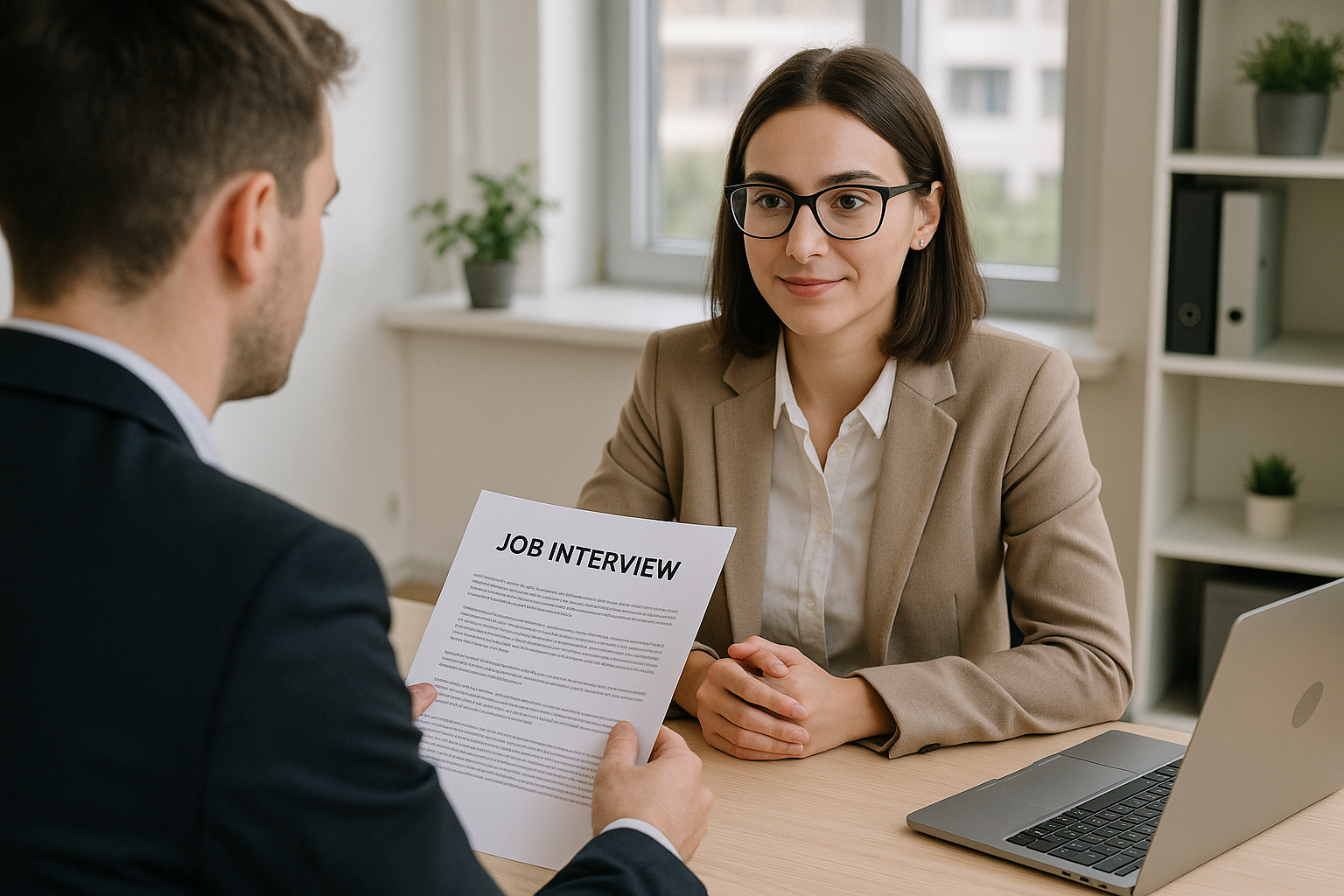A. The Interview That Changed Everything
Amit was a talented graduate. His degree was good, his knowledge was solid and his confidence was also good. When a placement came from a big MNC, Amit applied without any hesitation.
The technical rounds came and Amit easily cracked one question after another. His preparation was perfect – formulas memorized, concepts clear, and a strong grip on the subject.
Then came the final round – the HR interview.
When HR smiled and said, “So Amit, tell me about yourself,” and then everything stopped.
Amit was confident at first, but then a slight nervousness spread on his face. He started speaking some general lines –
“My name is Amit. I am from Indore. I did my graduation from XYZ College. I like cricket. That’s it.” HR’s smile slowly started to fade. The interview got over, and 2 days later the result came – Amit was rejected.
That day Amit learned an important lesson: “In any interview, they don’t only look at your technical knowledge, but also look at your leadership quality, confidence, problem solving skills and self awareness.”
Have you ever felt like Amit?
You have studied well. Your concepts are also solid. But when the time for interview comes, especially HR round, you get confused – what should I say, how should I say? You are not alone.
This blog is for all those ‘Amit’ – who are capable, hardworking, but do not know how to give the right answer to some tricky questions of HR.
In this blog you will find:
• Realistic examples
• Smart answers with emotional touch
• Common mistakes which you can avoid
• A simple formula to answer confidently Because job is not only obtained with knowledge, but also

with communication and clarity.
B. Why HR Questions Matter
Often students and job seekers take the HR round lightly and think:
“It’s just a formal round, it will happen anyway.” But in reality, the HR round is a filter – where it is seen whether you are just technically strong or professionally ready as well.
🧩 What does the HR round check?
✅ Communication – Are you able to express your thoughts clearly and confidently? Or do you hesitate, get confused?
✅ Confidence – Are you composed or nervous? Your body language and tone give immediate signals to HR.
✅ Self-awareness – Do you have a real idea of your strengths and weaknesses? Can you present yourself with real examples?
✅ Attitude – Is your nature open-minded and positive? Do you believe in teamwork, or do you only work in your comfort zone?
✅ Cultural Fit – Will you be able to adjust in the company’s environment? Do your values match their mission?
🎙️ HR round is not just “Tell me about yourself”…
They want to understand:
• How do you react under pressure?
• What are your future goals, and do they align with the company’s vision?
• Can you collaborate with the team?
• Do you have the quality to take leadership or initiative?
🤔 Something to think about:
If the company only wanted a technical person, then the HR round would have no meaning.
But when a company hires a candidate, Along with skills, they need a person who:
• Brings good energy
• Works smoothly with the team
• Solves problems without panicking
• Is committed to professional growth
💡 A small analogy:
If technical rounds are an “entry ticket”, then the HR round is a “final boarding pass”.

C. 7 Common HR Questions – And How to Answer Them Smartly
HR questions are not tricky — you just need to be smart in your answering them.
Here we will discuss Top 7 HR Questions, their purpose, and how you should answer them, with real-life examples.
1️⃣ “Tell me about yourself”
Purpose: Ice-breaker, and to check your self-awareness and communication.
✅ Smart Answer Format:
• Starting from current role/status
• Education or relevant skill highlight
• Quick mention of achievements or internships
• One line about hobbies or values
💬Example:
“Hi, I’m Neha, a Pharmacy graduate from ABC College. During my final year, I worked on a project related to herbal formulations which increased my interest in research. I’ve also done an internship in XYZ Lab where I assisted in quality control testing. Apart from academics, I enjoy journaling and group discussions.”
🚫 Mistake to avoid:
Do not repeat the resume in a boring or robotic tone.
2️⃣ “What are your strengths?”
Purpose: How confident are you in your qualities?
✅ Smart Answer Format:
• 2–3 strengths
• Add real-life examples with each one.
💬Example:
“One of my key strengths is time management. During my internship, I was handling college assignments and lab reports together and never missed a deadline. I’m also a quick learner – I picked up HPLC software skills within a week during training.”
3️⃣ “What is your weakness?”
Purpose: Are you honest? Do you know your improvement areas?
✅ Smart Answer Format:
• A real weakness
• At the same time also tell how you are achieving success.
💬Example:
“Earlier I used to hesitate in asking questions during group meetings, thinking they might sound silly. But now, I make notes and clarify things after the meeting or through follow-up mails. It’s helped me a lot.”
🚫 Mistake to avoid:
Don’t say “I’m too perfect” or “I work too hard” — HR easily spots them.
4️⃣ “Why do you want to join our company?”
Purpose: Have you done research about your company?
✅ Smart Answer Format:
• Reference to a project, value or initiative of the company
• Discuss how it matches your interests
💬Example:
“I read about your recent initiative on personalized medicine, and as someone interested in pharmacogenomics, I believe this aligns with my learning goals. Also, your focus on innovation and research really excites me.”
5️⃣ “Why should we hire you?”
Purpose: What is your self-confidence and value proposition?
✅ Smart Answer Format:
• Role requirements + your skills
• Highlight teamwork, learning attitude, or communication
💬Example:
“I believe my background in formulation development and my hands-on internship experience can directly contribute to this role. I am also very adaptive and eager to learn from experienced team members.”,
6️⃣ “Where do you see yourself in 5 years?”
Purpose: Are your goals clear? Are you growth-oriented?
✅ Smart Answer Format:
• Growth plan based (learning + contribution)
• Match the company’s vision
💬Example:
“In the next 5 years, I see myself taking on more responsibilities in research and leading small teams. I want to grow in a space where innovation and learning go hand-in-hand.”
7️⃣ “Do you have any questions for us?”
Purpose: Are you curious or just want a job?
✅ Smart Answer Examples:
• “How does your company support employee learning and development?”
• “Can you tell me more about the team I would be working with?”
• “What does success look like in this role in the first 6 months?”
🚫 Mistake to avoid:
Never say “No, I’m good. No questions.”

D. What HR is Actually Looking For (Beyond Words)
Many times candidates think that HR only listens to your spoken answers – But in reality HR also pays attention to unsaid signals: Your tone, confidence, energy, eye contact, and mindset.
These are the subtle signals that show the real picture of your personality.
👁️🗨️ What does HR observe – beyond the answer?
1️⃣ Authenticity
HR sees whether you are real or just speaking rehearsed lines.
• Does your answer flow naturally?
• Does your body language match your words?
• Are you genuinely excited or just want the job?
🔹 Pro Tip: Avoid scripted answers. Keep your story genuine and relatable.
2️⃣ Self-Awareness
Do you know what qualities and gaps you have?
• How do you articulate your strengths?
• Do you talk honestly about your weaknesses?
• Are you clear about your goals?
🔹 Pro Tip: Do self-assessments, take mock interviews, and do introspections.
3️⃣ Cultural Fit
Do you align with their team and values?
• Are you collaborative or a solo player?
• What is your attitude — positive, adaptive, or rigid?
• Are you willing to take and give feedback?
🔹 Pro Tip: Research the company’s values and culture (LinkedIn, website, etc.)
4️⃣ Emotional Intelligence
Can you handle pressure, manage conflicts, and have empathy?
• How do you react when tough questions come up?
• Can you communicate calmly even in uncomfortable situations?
• Do you try to understand others’ point of view?
🔹 Pro Tip: It is very important to show emotional stability and control – especially in the HR round.
5️⃣ Communication Skills (Clear and Effective Conversation)
HR looks at your clarity of thought, fluency, and confidence.
• Is your way of speaking confident or doubtful?
• Do you speak clearly, in a short and structured way or in a roundabout way?
🔹 Pro Tip: Practice – listen in front of a mirror, record and take mock interviews.
🔍 Quick checklist of important qualities for HR:
✅ Self-aware and honest
✅ Confident but not arrogant

✅ Good listener and communicator
✅ Team player with a growth mindset
✅ Aligned with company vision & values
E. How to Prepare for HR Interview – Tools & Practice Methods
🔧 Step-by-step Preparation Guide:
1️⃣ Understand and use the “STAR Method”
While answering HR questions, avoid giving random examples. Instead, use this powerful technique:
S.T.A.R.
• S – Situation: what was the challenge?
• T – Task: What is your responsibility?
• A – Action: What step did you take?
• R – Result: What was the outcome?
💬 Example – Strength Question:
“During my internship (Situation), I was given the task to review 100 patient files in 3 days (Task). I created a checklist system and collaborated with another intern to divide the work (Action), and we completed the task a day early with zero errors (Result).“
2️⃣ Prepare your career story
HR is not interested in “reading your resume”, they are interested in hearing your story. Prepare your journey to be in flow:
🎓 Education ➝
🧪 Internships/Projects ➝
🏆Learnings & Achievements➝
🎯Career Vision
💬 Example line:
“My academic background in pharmaceutical sciences, along with my project on herbal drug formulation, has sparked a deep interest in research-based roles.”
3️⃣ Take Mock Interviews – in a Realistic Environment
• Practice with friends
• Turn on your phone camera and record
• Listen and watch yourself – expressions, pauses, tone
📌 Pro Tip: Write self-feedback after the mock interview – what was good, what needs to be improved.
4️⃣ Research the Company – LinkedIn, Website, News

If you talk about the mission/vision of the company during the HR round, you look different from 80% of the candidates.
🕵️♂️ What to look for?
• Company’s recent projects
• Founders / Team background
• Culture: work-life balance, learning, innovation
• What key skills are required in the job description?
💬 Example answer:
“I read that your company is working on AI-based drug discovery – it matches my interest in modern pharmacology.”
5️⃣ Keep a list of 10 Golden Questions and answers ready
📌 Use PDF notes, flashcards, or notebook.
🗣️ Practice out loud – The more you prepare by speaking, the better.
6️⃣ Work on Body Language and Voice Modulation
How you say is more important than what you say.
• Smile (but not fake)
• Maintain eye contact
• Use hands naturally
• Be enthusiastic in your voice – avoid monotonous tone
7️⃣ Prepare “Tell me about yourself” like a 1-minute pitch
This question itself makes your first impression. Make it crisp, confident and personal.
🎯 Target – 45 seconds to 1 minute
8️⃣ Make a checklist a day before the interview
✅ Resume print
✅ Company info revise
✅ Common answers revise
✅ Formal outfit ready
✅ Confirm time and location
✅ Positive mindset!
F. Real-Life Example: Good vs. Bad Answer
Sometimes candidates answer HR questions as if they are just following formalities. Whereas HR wants you to create an impact with your answer.
Let’s see two versions of the same popular question – one wrong way and one smart way.
❓ Question: “Tell me about yourself”
❌ Bad Answer (Generic, Boring, Weak Impact)
“My name is Rahul. I am from Kanpur. I did my B. Pharm from XYZ College. I am looking for a job in your company. I like cricket and watching movies.”
🟥 What was the problem?
• Resume has been repeated
• Depth of personality is missing
• No impact or spark
• HR does not remember the candidate
✅ Good Answer (Structured, Personal, Memorable)
“Hi, I’m Rahul, a Pharmacy graduate from XYZ College. During my final year, I worked on a formulation project that helped reduce tablet disintegration time by 20%, which made me curious about R&D roles. I did my internship at ABC Pharma, where I got hands-on experience with quality testing and documentation. I’m very passionate about learning new processes, and I enjoy simplifying complex concepts for others. Outside work, I’m a cricket enthusiast and love reading biographies.”

🟩 What was good?
• Career journey explained in structured form
• Smart use of Internship & project
• Passion & hobbies balanced
• Communication clear & confident
✨ Pro Tip: Every answer should have 3 things:
1. Clarity – What do you want to say, it should be clear
2. Character – What kind of person you are, it should reflect that
3. Connection – Your answer should be related to the company or job
🔄 And a Real Example:
❓ Question: “What is your weakness?”
❌ Bad Answer:
“I have no weakness sir, I can do everything well.”
🟥 Problem: Overconfidence + unrealistic
✅ Good Answer:
“Earlier, I used to hesitate while speaking in group discussions, especially if senior members were present. But now, I’m working on it actively. I take part in group activities and practice speaking up during seminars, which is helping me gain confidence.”
🟩 Strength: Honest + shows growth + learning mindset
G. Final Advice: Be Prepared, Not Scripted
(Preparation is necessary, not acting)
Often students queue up for HR interviews, like school viva. But HR doesn’t want to hear any rote-learned script — they want to hear your story, your thinking, and your real confidence.
💡 Remember:
• HR round is a test of your emotional readiness
• This is a chance to make your personality shine
• If you answer naturally, honestly and confidently, you look different from the average candidate
🔑 Last-Minute Golden Tips:
✅ Keep your purpose clear – Job is not just for income, it is also for impact
✅ Practice, but do not overact – be fluent, not artificial
✅ Be relaxed on the day of interview – take deep breaths, smile
✅ Do not copy anyone else – present your real version
✅ Understand interview as a dialogue, not interrogation
🔋 Bonus Reminder: Preparation happens behind confidence! “When you start writing your story yourself, interviews become mere formalities.”
📣 This blog is for all capable students who want to learn to trust themselves.
You have that potential within you — all you need is:
• A little self-reflection
• A little smart preparation
• And an honest conversation on the day of the interview

🙏 Your interview can become the turning point of your story. Don’t take it lightly — handle it wisely.
You can also visit:





Your article helped me a lot, is there any more related content? Thanks!